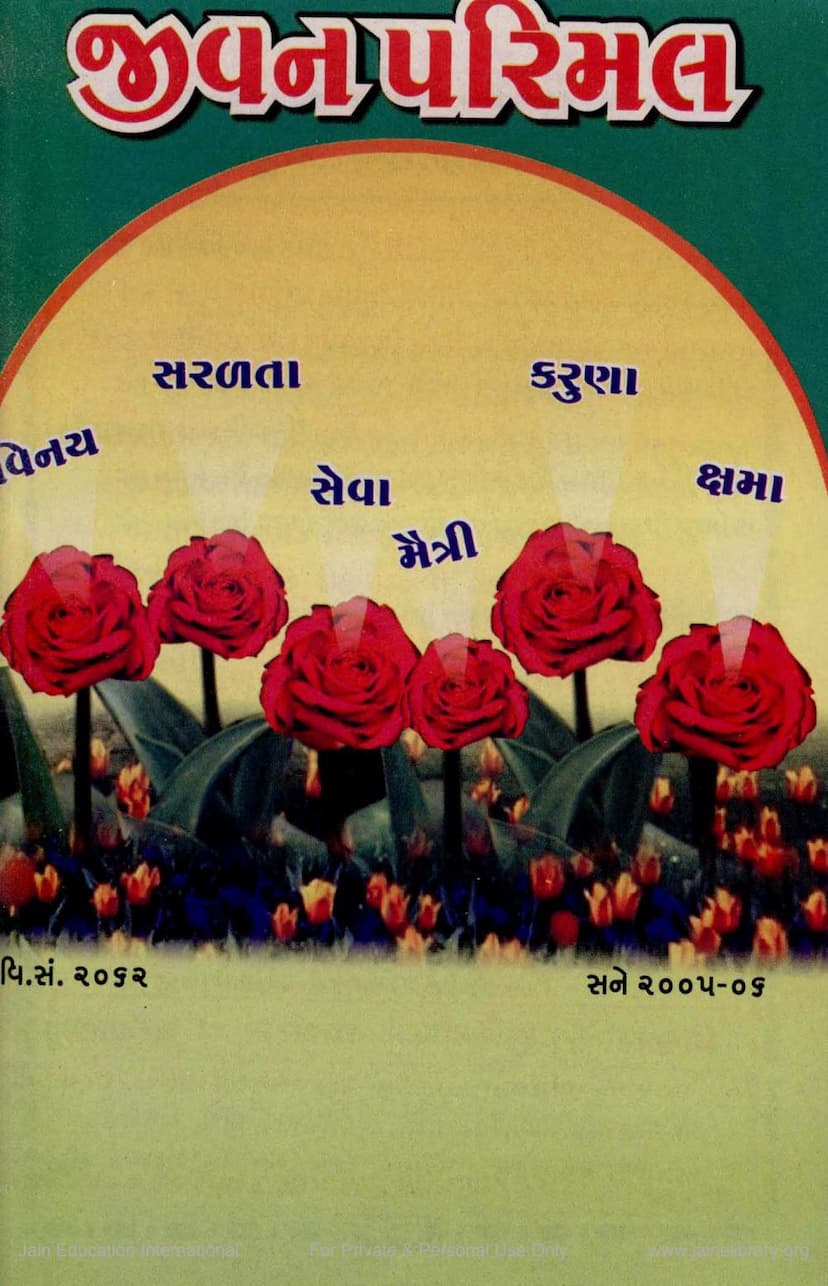Jivan Parimal
Added to library: September 2, 2025

Summary
This document is a Gujarati booklet titled "Jivan Parimal" (The Fragrance of Life), published by Shrimad Rajchandra Sadhna Kendra, Koba, for private and personal use. It appears to be a collection of inspirational thoughts, quotes, and short stories, likely distributed around the Gujarati New Year.
Here's a breakdown of its content, based on the provided pages:
Overall Theme: The booklet emphasizes living a virtuous, disciplined, and spiritual life. It draws inspiration from Jain philosophy and teachings, as well as from historical and spiritual figures. The overarching message is about self-improvement, ethical conduct, and seeking inner peace and spiritual growth.
Key Sections and Themes:
- New Year Greetings (Pages 2-3): The booklet begins with New Year greetings and a wish for a life filled with good thoughts, good conduct, and virtues, leading to a life of true "parimal" (fragrance). It encourages living a life of wisdom and well-being.
- Editorial and Publisher's Note (Pages 4): This section explains the tradition of publishing such inspiring literature during Diwali and the New Year. It highlights the importance of cultivating virtues like service, peace, love, cooperation, tolerance, family affection, simplicity, and humility. The goal is to foster personal and collective cultural, educational, spiritual, economic, and moral development.
- Inspirational Quotes and Thoughts (Pages 5-6, 20, 23, 28, 30, 43): Numerous short, impactful quotes from various spiritual leaders and personalities are presented. These cover a wide range of topics:
- Spiritual Practices: The importance of satsang (good company), devotion, meditation, and remembering God.
- Virtues: Emphasizing compassion, truthfulness, righteousness, detachment, forgiveness, and sincerity.
- Ethics and Conduct: Discussing the importance of truthful speech, avoiding anger, pride, deceit, and greed, and the value of serving others.
- Self-Improvement: Encouraging self-reflection, controlling the mind, and making conscious efforts to improve one's character.
- Time Management: The value of time and the importance of its judicious use.
- The Nature of Suffering and Happiness: Attributing suffering to internal desires and attachments and happiness to inner peace and contentment.
- Short Stories and Anecdotes (Pages 7-16, 18-19, 21-22, 24-27, 29, 31-33, 35-42): The booklet features several illustrative stories and anecdotes that convey moral and spiritual lessons:
- "How to Drive the Chariot of Life?" (Page 7-8): Uses the metaphor of a chariot to describe life, emphasizing the importance of remembering God, treating others with kindness, overcoming difficulties with peace, and staying focused on the ultimate goal of spiritual realization.
- "Humanity" (Page 8): Argues that humanity is the fundamental truth underlying all religions.
- "Let's Seize Today's Opportunity" (Pages 9-10): Highlights the immense value and rarity of the human birth and the favorable conditions for spiritual practice, urging readers to make the most of this opportunity.
- "Yudhishthira's Disguise" (Pages 11-12): Illustrates the principle of selfless service, showing how Yudhishthira served the wounded soldiers, including his enemies, disguised to avoid causing them embarrassment.
- "Inheritance of Wealth or Dharma?" (Page 12): Questions the priority given to material inheritance over spiritual inheritance.
- "Conversation with God" (Pages 13-14): A story about Ramana Maharshi, showing that true service to God is found in serving the suffering, exemplified by his care for a leper couple.
- "Kumarapala's Tears" (Pages 15-16): Depicts King Kumarapala's grief not at the death of Acharya Hemchandracharya but at his own misfortune for not being able to offer him alms due to his royal status.
- "Ways to Overcome Worry" (Page 16): Offers practical advice for managing worry.
- "The Desire for God" (Pages 17-18): Explains that true desire for God is like the desperate struggle for breath when one's head is submerged in water.
- "Discipline" (Page 18): Highlights the adherence to discipline even in the face of death, using the example of Ramprasad Bismil.
- "Value of Time" (Pages 19-20): Reinforces the idea that time is precious and its proper use is crucial for both worldly and spiritual progress.
- "The Impact of a Small Event" (Pages 21-22): Shows how a small incident of witnessing poverty profoundly impacted Mahatma Gandhi, leading him to adopt the loincloth.
- "Who is Disabled?" (Pages 30-31): Defines being disabled not by physical limitations but by the underutilization of one's abilities.
- "Why Fear Death?" (Pages 31-32): Uses the example of Khudiram Bose to illustrate that revolutionaries and those with strong conviction do not fear death, viewing it as a transition.
- "The Fruit of Firm Resolve" (Pages 33-34): Highlights Winston Churchill's success achieved through hard work and a strong resolve.
- "The Kind One" (Page 34): Tells the story of Chittaranjan Das as a child, demonstrating his compassion by using his money to buy books for a poor student.
- "God's Realization" (Page 35): Uses the analogy of carrying stones to illustrate that inner vices like anger, greed, and lust prevent one from realizing God.
- "Worship of Letters" (Page 36): Emphasizes that true respect for scriptures lies in understanding and practicing their teachings, not just in outward veneration.
- "Happiness and Peace" (Pages 37-38): Contrasts the common pursuit of external pleasures with the true source of happiness and peace being within oneself.
- "The Joy of Giving" (Page 41): Shares Vinoba Bhave's childhood experience of the joy of giving, instilled by his mother.
- "Five Friends" (Page 42): Identifies honesty, simplicity, truthfulness, sincerity, and commitment as essential friends for a peaceful life.
- "The Glory of Satsang" (Page 42): Illustrates how even insignificant things can achieve importance through good association.
- Activities and Mission of Shrimad Rajchandra Sadhna Kendra (Page 44): This section outlines the objectives of the organization, which include upholding Indian culture, studying and disseminating knowledge of spiritual scriptures, promoting devotional music and yoga, and engaging in various spiritual and educational activities.
In essence, "Jivan Parimal" serves as a guide to living a meaningful and virtuous life, encouraging readers to cultivate positive qualities, engage in spiritual practices, and contribute positively to society, drawing wisdom from spiritual traditions and exemplary lives.